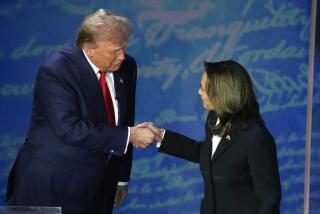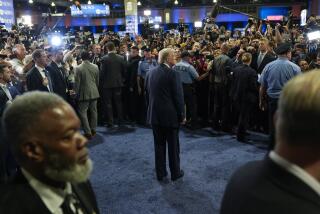Candidates Look to Break Out in Waning Days
- Share via
ST. LOUIS — Forget the policy back and forth, the sighs, the smirks, the global free-for-all, the competing messages that Al Gore and George W. Bush would like voters to take away from the 270 minutes of prime-time discussion that just ended.
With 19 days of hand-to-hand campaign combat ahead, the choice facing the electorate on Nov. 7 is the same as it was entering the ballyhooed presidential debates: Change vs. risk. Substance vs. style. Ability vs. likability.
Or as independent political analyst G. Terry Madonna put it: “Do you want to trust and like the president--is that more important--or do you believe you have to vote for Gore to keep the peace and prosperity we’ve had the last eight years?”
The debates--sometimes gentlemanly, more often not--will now give way to an all-out sprint through the final weeks of an election that remains too close to call. While both candidates to some extent accomplished what they needed in their televised matchups, neither was able to use the forums to pull sharply ahead in opinion polls or change the essential dynamic of the race.
At this point, Gore and Bush have distilled their competing messages to the essence. The Democrat believes the choice facing voters revolves around the question of who should benefit from America’s prosperity. The Republican feels the presidential options are “between big federal government or somebody who’s coming from outside of Washington, who will trust individuals,” as he said of himself Tuesday night in St. Louis.
But there is little time left to explain their differences to the American public. So what voters can expect next is “the usual pounding with advertising, who makes a mistake and whatever happens with external events,” said Paul Maslin, a Democratic pollster unaffiliated with the Gore campaign, referring to everything from stock market fluctuations to the crises in the Middle East.
Bush aides said the Texas governor will focus on a short list of key states: He was in Wisconsin and Michigan on Wednesday and plans to return next week. He will also visit Missouri, Florida, Pennsylvania, Iowa, Illinois and Tennessee, Gore’s home state, in the days to come.
Speaking on Rush Limbaugh’s radio show, Bush asserted that California is also in play and he plans to visit again before Nov. 7.
“California’s going to be a surprise for people come election day, particularly the vice president,” Bush said, in the face of numerous polls that have consistently given Gore a solid lead. “He’s taking it for granted. I am not.”
The Bush campaign is not running ads in California and has not since the primaries. But the Republican Party is spending $1.6 million a week statewide, airing spots on education and prescription drugs. Two new ads--one on the budget and the other on taxes--will soon replace those.
Polls, however, show Bush has gained little benefit from the Republican spending binge, and Gore and the Democratic Party have no plans to advertise in California.
Bush has made it clear that he will spend much of the time that remains hammering away at what he says is the fundamental difference between the two camps, a difference that he spoke of throughout the day Wednesday: Gore is a big spender, big government guy, while Bush believes in limited government and trusts the people with their own lives, decisions and money.
Gore campaign strategists declined to draw their map for the closing days, though they insisted even states that recently seemed to tip Bush’s way--Ohio being the biggest among them--remain targets.
“If anything, after last night’s performance, our horizon may broaden,” said Tad Devine, a Gore senior strategist. “We think we have a very large playing field in terms of electoral votes. We might get a little more aggressive in terms of paid media and where the candidates go.”
Douglas Hattaway, a Gore spokesman, said the vice president plans to lay out what he called “the big choices” facing Americans regarding how best to capitalize on the nation’s record prosperity. Gore, returning to a favorite tack, will meet with a different family every day to discuss so-called kitchen table issues--sometimes in homes, sometimes in workplaces, schools or parks.
“Al Gore is proposing that we use our prosperity wisely to benefit everybody, not just a few,” said Hattaway. “After the past eight years, America has put its house in order. We will build on the foundation . . . make sure that all American families share in the prosperity.”
In the debate here Tuesday night, Gore talked at length for the first time about how well off the country has been under the Clinton administration. Advisors said he waited intentionally until the end of the campaign to spread that message.
“I think three weeks of doing this intensely is the right amount of time,” Devine said. “This is the final building block in the process . . . the most powerful one.”
Political analysts said the series of televised exchanges changed few minds, although it did allow both candidates to address some of the negative perceptions each faced.
Stuart Rothenberg, editor of a nonpartisan political newsletter in Washington, said the debates likely “accomplished a bit more for Bush than for Gore only because there were more question marks for Bush. I think he established that he possesses at least the minimum qualifications for being president.”
Gore, on the other hand, had three very different debates: one in which he was overly aggressive, one in which he was timid and exaggerated his record and one in which he got it all together, Rothenberg said.
“Gore has tried during the debates to draw distinctions on issues,” he said. “He was effective in the third debate . . . . I still think Gore needs to convince voters that Bush is a risky choice.”
Florida, where Bush’s brother is the governor, should be safely in the Republican’s column, but the candidates are tied there. Jim Kane, an independent pollster and political analyst in Florida, said the debates did not change a lot of minds in the race. If he had to say, Kane would probably predict that the exchanges helped Bush marginally more than Gore.
“Bush suffered an image problem,” Kane said. “He wasn’t the sharpest tool in the shed. I think the debate calmed some of those fears among Florida voters. He showed he could perform and performed well under pressure, but I can’t say it produced any huge movement in his direction.”
Ed Sarpolus, an independent poll taker in Lansing, Mich., said the 5% of truly undecided voters will likely decide the election in his closely contested state, where Gore has lost ground in recent weeks.
“Basically, coming into the third debate, Bush had the momentum and Gore was losing traction,” Sarpolus said. “Favorability is now dead even, and [Gore’s] lead advantage is gone. The only thing he’s maintained the lead on [in terms of issues are] health care and education.”
The big question though for both candidates is whether they can break out of the dead heat in less than three weeks. Republican strategist Scott Reed thinks Bush won the debates and believes that the race is going his way.
But “we’re in a 20-day race where everything matters,” Reed said. “It’s going to be extremely close, with undecided voters making up their minds right up to the day before election day.”
*
Times staff writers Michael Finnegan and Jeff Leeds contributed to this story.
More to Read
Get the L.A. Times Politics newsletter
Deeply reported insights into legislation, politics and policy from Sacramento, Washington and beyond. In your inbox twice per week.
You may occasionally receive promotional content from the Los Angeles Times.












